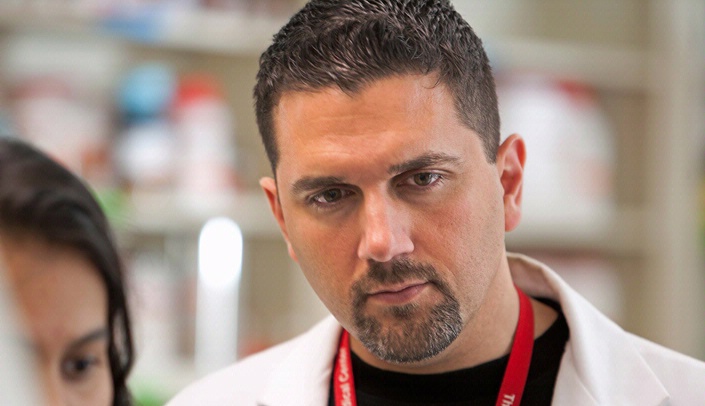Joseph Vetro, Ph.D., assistant professor of pharmaceutical sciences, wants his research to impact patients. Publication is great, yes. But what does it mean if it doesn’t eventually help people?
And Dr. Vetro believes that technology to effectively deliver RNA interference molecules (RNAi) can improve treatment for cancer patients. RNAi could be used to suppress gene expression in tumors that causes them to eventually become more resistant to chemotherapy. This could make chemotherapy more effective for people fighting cancer.
The tough part is getting therapeutic levels of RNAi into cancer tumors and metastases. Administered intravenously, RNAi levels end up undetectable, ineffectual.
Dr. Vetro had an idea to increase the potency of RNAi in tumors by forming polymer complexes with cholesterol-modified RNAi. He has preliminary evidence that this works.
But the stuff he’s working on in his lab needs to traverse many steps to get to clinical translation, to people. How does one do this? He needs someone else, a big company, to pick it up and take it the rest of the way, to the marketplace. And to do that? He needs to de-risk it, so it’s a good investment for these companies, by obtaining favorable Phase I clinical trial data. That makes it a better sell.
“You need to get industry to take a serious look at you,” Dr. Vetro said.
To start the process, Dr. Vetro and his wife formed a startup company, Actorius Pharmaceuticals, which recently was awarded National Institutes of Health (NIH) Small Business Technology Transfer (STTR) grant with UNMC collaborators Rakesh Singh, Ph.D.; Samuel Cohen, M.D., Ph.D.; Yazen Alnouti, Ph.D.; and Kenneth Cowan, M.D., Ph.D. They’re working to move the technology closer to a Phase I clinical trial in breast cancer patients.
To attract a company, they’re thinking like a company. They are working with a strategic business consultant and have obtained matching economic development funding from the state.
The ultimate end goal is to develop the technology for clinical use. How?
“Sub-license the technology to a pharmaceutical company,” Dr. Vetro said.
It’s a strange thing to put so much work into something, to discover it, to nurture it, to have it be yours, only to give it away.
But isn’t that what we do?
“It’s like letting your kids go out into the world,” Dr. Vetro said.
It would be a big day to see the kids all grown up.

Great work Dr. Vetro.
Congratulations on your successes Dr. Vetro and Chris Allmon!
Good luck Dr. Vetro and Chris!
Nice work, Joe. Congratulations on the funding.
Good luck and best wishes for success on this venture.
Great!